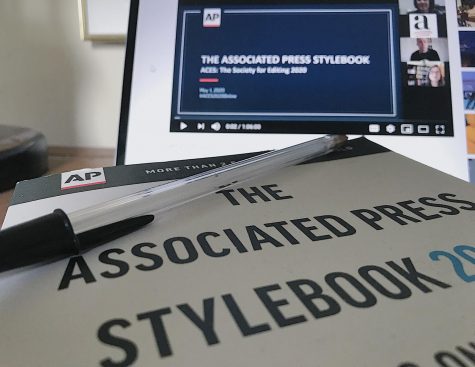The War on Christmas: A Merry and Jolly Delusion
November 13, 2019
In recent years, there has been a push to say “Happy Holidays” instead of “Merry Christmas,” as many feel it is the more inclusive option, considering not everyone celebrates Christmas.
This has outraged many, including President Donald Trump. On Dec. 24, 2017, he took credit for inspiring a renaissance of “Merry Christmas”-ing.
“People are proud to be saying Merry Christmas again,” he tweeted. “I am proud to have led the charge against the assault of our cherished and beautiful phrase. MERRY CHRISTMAS!!!!!”
Was the phrase ever under assault, though? Is there really a war on Christmas?
In the 17th century, Puritans banned Christmas because it was not in agreement with their interpretation of the Bible. Now that, indeed, was an organized attack on the holiday.
The modern debate can be traced back to 2005, with the release of radio host John Gibson’s book “The War on Christmas: How the Liberal Plot to Ban the Sacred Christian Holiday Is Worse Than You Thought.” The book, which caused an uproar, focuses on how people would ban nonreligious symbols like Santa Claus in an effort to make Christmas as it was in the Bible. Somewhat taking it out of context, many came to believe that liberalism was bent on destroying Christmas. Bill O’Reilly, for example, said liberals were using the phrase “Happy Holidays” as a way to enact “a new America” apart from traditional Christmas in 2012.
Conservatives used the Obamas, who put “Season’s Greetings” on their annual White House holiday cards instead of “Merry Christmas” for all eight years, as evidence. “Obamas’ Holiday Card Doesn’t Mention Christmas for 8th Year,” Fox News tweeted on Dec. 14, 2016.
Dan Cassino, a professor at Fairleigh Dickinson University, critiqued Gibson’s book and conservative Christmas anxieties. “They say the next step after saying ‘Happy Holidays’ is abortion on demand and euthanasia. That’s a hell of a slippery slope, but that’s the argument being made.”
Watching Fox News increases the chances of someone believing in the “War on Christmas,” as it was called, by 5 to 10%, according to a study by Fairleigh Dickinson University.
Over a quarter of Americans are Evangelical Christians. With this in mind, Trump made fighting against the War on Christmas a campaign policy. Many believed he was doing this solely to bring Christian voters to his side, regardless of his actions and moral.
The Trumps, along with many other Christians, have fought against phrases other than “Merry Christmas” as well.
PBS NewsHour’s William Brangham, in conversation with Tony Perkins, president of the Family Research Council, and Amy Sullivan, an author and podcaster, explained why.
Perkins believes it’s not the phrase “Merry Christmas” itself that makes the difference to Christians — instead, the words are just a small part of a bigger picture: “It’s emblematic of a bigger debate that’s really been raging in this country, and that is the ability to express one’s faith openly, without concern,” he said.
If Christians only desire freedom of expression, however, it begs the question: How can they be upset when people choose to acknowledge other religious holidays by saying Happy Holidays instead of Merry Christmas?
Sullivan herself is a Christian, and her husband is Jewish. Therefore, her family celebrates both Christmas and Hanukkah. For her, the idea that choosing to celebrate one holiday over the other makes one’s belief less serious, is not one she can subscribe to.
“I think Jesus would not really care if we said Merry Christmas,” she said.
Instead, she argued, Jesus would probably care more about the focus on consumption around Christmas-time, and the prizing of exchanging gifts rather than going to church.
“That can be a concern to those of us who see it as a celebration of the birth of our Savior,” she continued.
Both Perkins and Sullivan agree: Regardless of how people greet them during the holiday season, the real issue is people celebrating Christmas as a purely secular holiday.
According to Pew Research Center, less than half of Americans celebrate Christmas solely as a religious holiday, while a third celebrate it as a cultural holiday. The holiday has turned into an opportunity to celebrate consumerism rather than Christianity.
“Anyone who has a small child obsessed with Santa Claus knows how hard it is to fight against those influences and yet, for some people, that is the sum-total of what Christmas is,” Sullivan said.
She mentioned Bill O’Reilly as one of many Fox News anchors who hyper-focus on which corporations and department stores have the most “Christmas spirit” and which ones say Happy Holidays rather than Merry Christmas.
Instead, she argues, these sources should focus on getting people back to Church and to the religious holiday rather than promoting the consumerist, secular holiday.
According to the National Retail Federation, Americans generally spend just under $1000 on Christmas gifts, and Pew Research Center polled how these shoppers want to be greeted during the holiday season. Thirty-three percent preferred Merry Christmas, 15% preferred Happy Holidays, and over half said it did not matter.
It is important to note the difference between expression and oppression here.
Christians are not oppressed when non-Christians greet them without saying Merry Christmas. The phrase “Happy Holidays” in no way prevents anyone from practicing their individual religion or celebrating that religion’s holidays; expression only becomes oppression when it infringes upon someone’s ability to practice their beliefs openly. That is not at all the case here. There is no war on Christmas — at least, not from people who prefer Happy Holidays to Merry Christmas.
Have a great and open-minded holiday season.










If you want a picture to show with your comment, go get a gravatar.